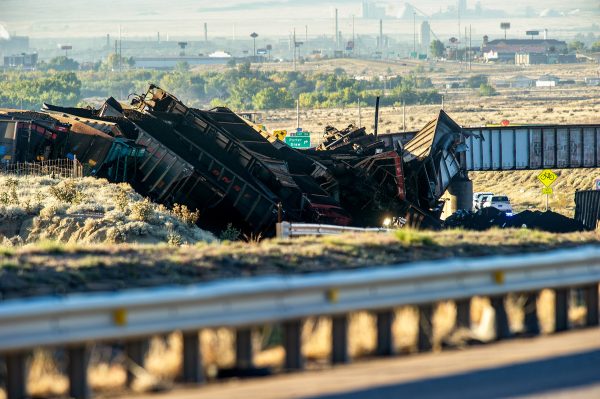Colorado creates new rail safety office to study critical issues in wake of deadly derailments

Colorado lawmakers May 8, the final day of the state legislative session, created an Office of Rail Safety within the Public Utilities Commission to study and implement state rail regulations in the wake of deadly, toxic train derailments from Pueblo to East Palestine, Ohio.
If House Bill 24-1030 is signed into law by Gov. Jared Polis (editor: he signed it on May 12 in Pueblo), the new office would be required to submit a report to the General Assembly by Dec. 1 assessing train lengths, emergency response, financial responsibility for cleanups of hazardous materials, and necessary staffing and equipment levels for the implementation of safety measures.
“Train derailments and obstruction accidents have increased and we must protect the safety of workers and our communities, particularly as we move to expand passenger rail,” prime bill sponsor Sen. Lisa Cutter, a Littleton Democrat, said in a press release.
Lawmakers this session also passed a bill aimed at tapping into dramatically increased federal funding for passenger rail to launch Front Range Passenger Rail from Denver to Fort Collins and extend service from Denver through Winter Park to Steamboat Springs and Craig. That’s on top of legislation meant to incentivize dense housing near rail and bus stations.
“Hazardous materials are frequently moved by rail through heavily forested areas near critical waterways, so an accident has the potential to be catastrophic,” Cutter added. “This bill will create an Office of Rail Safety, so we can oversee rail operations and collect data to help address the real safety issues we know are plaguing the rail industry.”
The legislation’s ultimate goal is to increase emergency readiness, including state oversight of wayside detector systems, and require train crossings to be clear for emergency vehicles. Cutter and co-sponsor Sen. Tony Exum, a Colorado Springs Democrat, also want to empower railroad unions to request safety investigations by the new office, with increased penalties for safety violations.
“As Colorado continues to grow, our rail network will become even more critical to the sustainability of our state,” Exum said in the press release. “Train derailments can shut down critical transportation networks, cause major environmental harms, and threaten the health and safety of countless individuals.”
Early versions of the bill would have mandated many of the key safety elements in HB-1030 instead of just requiring studies and a report to the Legislature for future action. Railroad officials contend the state requirements are redundant.
“Safe operations drive every aspect of the railroad industry,” Mike Jaixen, senior manager of corporate communications for Union Pacific Railroad, wrote in an email. “The goals and objectives of HB 1030 are already covered by federal regulatory oversight as well as the rail industry’s own vigilant operating practices, inspections, maintenance programs and first responder training and coordination. We appreciate the collaboration from the governor’s office and legislative leadership on addressing key aspects of the bill.”
Environmental groups have been pushing for increased rail safety as the oil industry in neighboring Utah steps up production in the Uinta Basin area and looks to move more and more crude oil along Union Pacific’s Central Corridor rail line, which travels for 100 miles along the Colorado River before crossing under the Continental Divide at Winter Park and down to Denver before heading southeast to Gulf Coast oil refineries.
The groups, which have joined Colorado governments — led by Eagle County — in suing to stop oil-rail expansion in Utah, praised passage of HB-1030.
“By passing this bill, the Colorado legislature took an important first step toward addressing dirty hazardous crude oil shipments from Utah that have begun flooding our state on rails,” Center for Biological Diversity’s Southern Rockies Director Allison Henderson wrote in an email.
“Tens of thousands of barrels a day are already coming here on rail lines near the Colorado River, and that will vastly increase if the Uinta Basin Railway is built,” Henderson added. “These oil shipments are an accident waiting to happen. I urge Gov. Polis to sign this bill to protect Colorado’s communities, our waters and our environment.”
Proponents of the Uinta Basin Railway project have petitioned the U.S. Supreme Court to intervene on their behalf, even as they look to expand other methods of increasing the transport of crude oil on the rail line through Colorado.
Editor’s note: This story first appeared on Colorado Newsline, which is part of States Newsroom, a nonprofit news network supported by grants and a coalition of donors as a 501c(3) public charity. Colorado Newsline maintains editorial independence. Contact Editor Quentin Young for questions: info@coloradonewsline.com. Follow Colorado Newsline on Facebook and Twitter.


Latest posts by David O. Williams (see all)
- Democratization or ruination? A deep dive on impacts of multi-resort ski passes on ski towns - February 5, 2025
- Western Rail Coalition looks to revive passenger rail service on long-dormant line connecting Colorado mountain towns - January 22, 2025
- Colorado ski town looks to dig deep, diversify energy sources as climate change threat looms - January 10, 2025

You must be logged in to post a comment Login